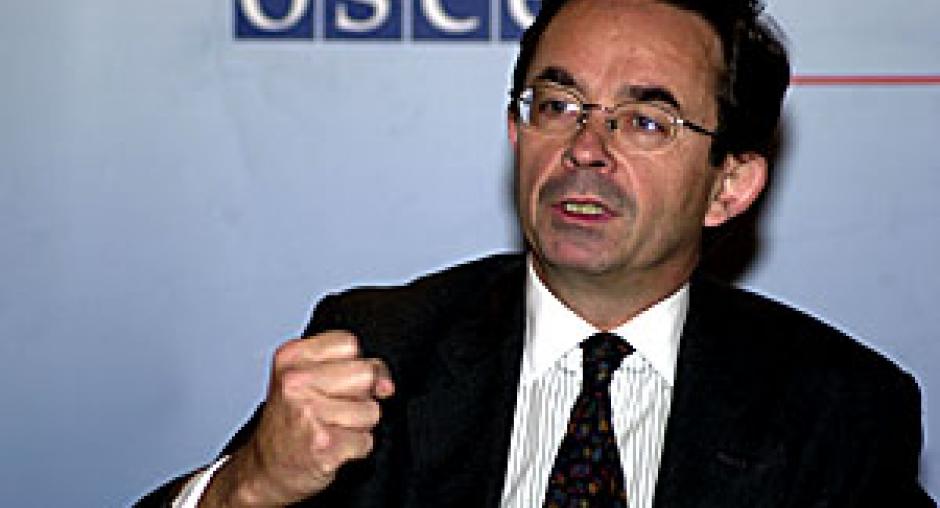Newsroom
Stop using evidence obtained by torture, OSCE human rights body says
WARSAW/VIENNA 7 November 2003

(OSCE/Alex Nitzsche)Ambassador Christian Strohal, Director of the OSCE's Office for Democratic Institutions and Human Rights, speaking to the press at a meeting on the prevention of torture in Vienna, 7 November 2003. (OSCE/Alex Nitzsche) Photo details
WARSAW/VIENNA, 7 November 2003 - The Director of the OSCE's Office for Democratic Institutions and Human Rights (ODIHR), Ambassador Christian Strohal, today called on OSCE participating States to take measures to prevent the use of evidence obtained by torture.
"In many countries, the existing reward structure for law-enforcement officials encourages the use of torture in trying to extract a confession," he said.
"Police are expected to solve cases; they are rewarded for solving cases. Unfortunately, a case is considered solved usually only once there is a confession. Such a reward structure that encourages the use of physical force is unacceptable. It must end."
Ambassador Strohal was speaking in Vienna at a meeting on the prevention of torture organized by the ODIHR and the current Netherlands Chairmanship of the OSCE.
More than 200 representatives of OSCE participating States and non-governmental organizations attended the meeting, which reviewed progress made by countries throughout the OSCE region on preventing torture and also considered measures to be taken to prevent the further use of torture and other forms of inhuman or degrading treatment or punishment.
The ODIHR Director stressed that the use of torture was not only a reflection of poor criminal-investigation capacities but also resulted, much too often, in deaths in custody: "Only a set of legal and practical guarantees and constant monitoring by independent international bodies can ensure that the use of torture is continuously reduced."
The ODIHR recognizes that eradicating torture requires involvement by a cross section of the population. "Civil society must be involved. Police must change the way they reward their officers so that good behaviour is encouraged and rewards are no longer dependent on raw calculations of numbers of cases solved," said Ambassador Strohal.
"Judges must stop allowing the introduction of statements into court proceedings when these statements were made as a result of torture. Prosecutors must protect against the use of such statements and must prosecute state officials who engage in torture. And a strong legal defence system is needed, as defence lawyers are often the first people to speak with those that have been tortured."
Torture not only shatters the human being, it destroys the dignity of society as a whole. Societies in which torture is condoned run a higher risk of violations of other crucial elements of the rule of law. This, in turn, presents serious dangers for security and stability.
Ambassador Strohal said that states never have the right to resort to torture, even during wartime or in states of emergency: "Too often, particularly in recent times, serious human rights violations seem to be acceptable in the face of new security concerns. But this is in clear contradiction to the OSCE concept that holds that only if human rights are respected, only if state arbitrariness has been eradicated, only then can we talk about real long-term security."
"In many countries, the existing reward structure for law-enforcement officials encourages the use of torture in trying to extract a confession," he said.
"Police are expected to solve cases; they are rewarded for solving cases. Unfortunately, a case is considered solved usually only once there is a confession. Such a reward structure that encourages the use of physical force is unacceptable. It must end."
Ambassador Strohal was speaking in Vienna at a meeting on the prevention of torture organized by the ODIHR and the current Netherlands Chairmanship of the OSCE.
More than 200 representatives of OSCE participating States and non-governmental organizations attended the meeting, which reviewed progress made by countries throughout the OSCE region on preventing torture and also considered measures to be taken to prevent the further use of torture and other forms of inhuman or degrading treatment or punishment.
The ODIHR Director stressed that the use of torture was not only a reflection of poor criminal-investigation capacities but also resulted, much too often, in deaths in custody: "Only a set of legal and practical guarantees and constant monitoring by independent international bodies can ensure that the use of torture is continuously reduced."
The ODIHR recognizes that eradicating torture requires involvement by a cross section of the population. "Civil society must be involved. Police must change the way they reward their officers so that good behaviour is encouraged and rewards are no longer dependent on raw calculations of numbers of cases solved," said Ambassador Strohal.
"Judges must stop allowing the introduction of statements into court proceedings when these statements were made as a result of torture. Prosecutors must protect against the use of such statements and must prosecute state officials who engage in torture. And a strong legal defence system is needed, as defence lawyers are often the first people to speak with those that have been tortured."
Torture not only shatters the human being, it destroys the dignity of society as a whole. Societies in which torture is condoned run a higher risk of violations of other crucial elements of the rule of law. This, in turn, presents serious dangers for security and stability.
Ambassador Strohal said that states never have the right to resort to torture, even during wartime or in states of emergency: "Too often, particularly in recent times, serious human rights violations seem to be acceptable in the face of new security concerns. But this is in clear contradiction to the OSCE concept that holds that only if human rights are respected, only if state arbitrariness has been eradicated, only then can we talk about real long-term security."
